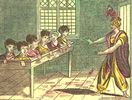
Return to Collections A to Z Index
Contains documents representing a broad spectrum of militant political, social and religious dissent in the United States, from the post-World War II period to the present. The Collection currently exceeding 168,000 items emanating from over 5,000 organizations, constitutes the country's largest research collection of right and left wing U.S. extremist groups, from 1950 to 1999.
The collection began when Gordon Hall, a young veteran of the Pacific Theatre during the war, first encountered the printed propaganda issued by domestic hate-your-neighbor organizations/groups in the late 1940's. He supported his investigations and research of these organizations by giving public lectures about them. Materials from all corners of the country were collected, enabling him to document statements made in lectures as well as in a growing number of expository articles written for newspapers and magazines.
Grace Hoag, an alumna of Smith College, began collaboration with Hall during the 1960's, assisting the research and investigation and expanding the collection beyond its initial emphasis.
Includes publications of Anti-Abortion organizations; Anti-Integrationist organizations; Anti-Semitic and Racist political parties; Christian Identity organizations; Communist organizations; Communist political parties; Communist publishers; Congressional investigating committees; Cults and Alternative religions; Extreme Left-Wing publishers; Ku Klux Klan organizations; LaRouche organizations; Marxist-Leninist organizations; Militant Anti-Communist organizations; Militant Populist organizations; Neo-Nazi organizations; Pacifist organizations; Pro-choice abortion organizations; Racial and Ethnic Consciousness organizations; Right-Wing Christian religious organizations; Right-Wing publishers; Socialist organizations; and Women's movement left and right organizations
Please Note: The Library has temporarily suspended digitization requests for materials from the Gordon Hall and Grace Hoag Collection of Dissenting and Extremist Printed Propaganda, Parts I and II, 1926-2000.The Library is in the process of digitizing large portions of the collection over the next 3 years (2022-2025). In order to complete this significant digitization project the Library must close large portions of the collection for periods of time.
Hall-Hoag materials that are not actively being digitized are available for in-person research. Please complete the Ask Us form if you are interested in looking at particular organizations or need information about scheduling a reading room visit.
...more informationOliver St. Clair Franklin gathered this collection of books written by authors of African heritage. Many of the volumes are also signed by the authors. The collection contains a total of 903 titles dating from 1786 to 2019 with the bulk published in the mid 20th century.
Franklin described his reason for creating this collection this way: �Collecting African-American literature was my personal way of building resilience and resistance�a symbol of my quest for humanness."
Oliver St. Clair Franklin, the son of a Methodist minister, grew up in Baltimore, Maryland. He attended Lincoln University, a Historically Black College and University (HBCU), during the Civil Rights movement and earned a bachelor's degree in economics in 1966. Following a professor's advice, he continued his education abroad at Balliol College at the University of Oxford in England, where he was awarded a bachelor's of philosophy in economics in 1970.
Returning to Baltimore, he began his career working in the governor�s office. Later, after moving to Philadelphia, he was hired by the president of the University of Pennsylvania (Penn), Martin Meyerson, initially working in community affairs and subsequently as an assistant to the president. During his time at Penn, Franklin demonstrated his commitment to African American culture by creating the first Philadelphia Black Film Festival in 1972. His focus on arts and administration continued when, in 1984, he was appointed deputy city representative for arts and culture by Philadelphia's first Black mayor, W. Wilson Goode Sr., a position Franklin held for five years.
Franklin then transitioned into the financial sector, where he steadily advanced, becoming a senior vice president for Fidelity Investments in 1993. His path also took an entrepreneurial turn, as he was inspired by a 1993 meeting with Nelson Mandela to create his own firm called Reinvest in South Africa. Following this, he headed International House Philadelphia and served as vice chairman for a financial services digital design firm. He now works as a senior adviser to companies and banks in the U.S. and U.K. On the international stage, Franklin was appointed as the third Honorary British Consul for Greater Philadelphia in 1998. He considers his proudest achievements in this role to be taking Philadelphia high school students to Britain and successfully bringing the Duke of Edinburgh�s International Award program for youth to Philadelophia.
...more information